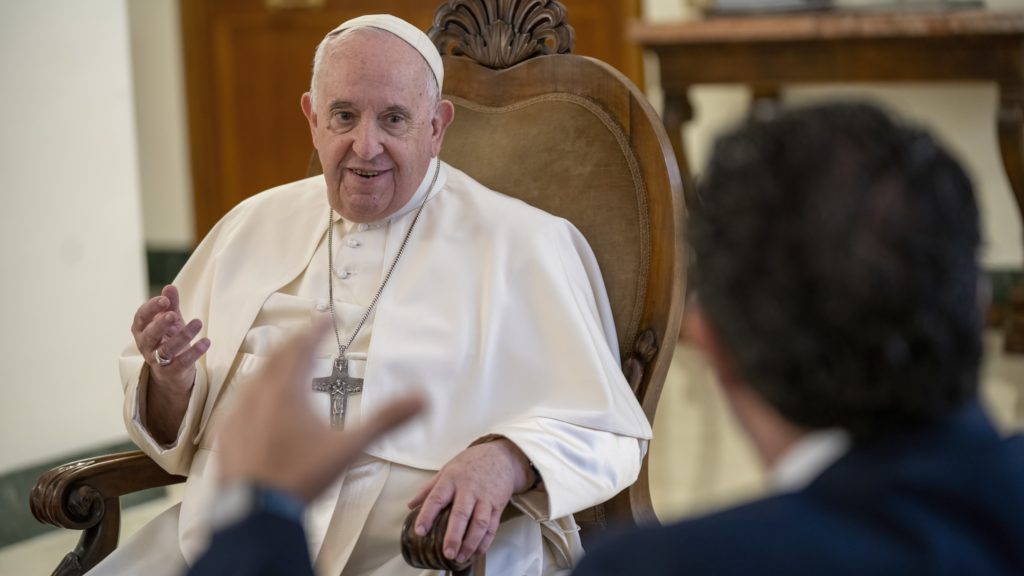ROME — Among the great ironies of the Pope Francis papacy is that as the Cardinal of Buenos Aires, Jorge Mario Bergoglio was infamous for rarely giving interviews and, in general, avoiding contact with the press as much as humanly possible. Once, when he was compelled to accept a brief ride home from a reporter after an event because public transportation had broken down, he ruefully congratulated the reporter for having penetrated his usual defenses.
Yet as pope, Francis sometimes seems to operate on the “interview a week” plan, often making waves and raising eyebrows in his exchanges with reporters. His most recent outing came on April 23 in a conversation with the Argentine paper La Nación.
One interesting item concerned Archbishop Georg Gänswein, the longtime priest secretary to Pope Benedict XVI, who’s achieved notoriety of late for the frank manner in which Gänswein discussed contrasts between the two popes in a series of media interviews and in a new book after Benedict’s death.
Not long ago, rumors had Gänswein set to be sent packing as a papal envoy to Costa Rica. In fact, Francis told Argentine journalist Joaquín Morales Solá that he’s left the choice of whether to stay in Italy or return to Germany to Gänswein, but in any event he’ll have to leave the Vatican.
The public manner in which Gänswein’s exile is being prepared has left some observers nonplussed; the widely read blog Il Sismografo (“The Seismograph”) asked why Francis appears determined to put Gänswein to pasture at the age of 66, rather than giving him a new pastoral assignment.
To be clear, papal secretaries have always been dispatched away from Rome after the pope they served died; what’s different in this case is that little effort is being made to put a polite face on things, which may suggest that Francis’ patience with perceived critics has run a bit thin.
Two other items from the La Nación interview suggest more directly that Francis may be a pontiff who, more and more, hears time’s winged chariot hurrying near.
First, Francis issued another strong defense of his predecessor St. Pope John Paul II, calling him “a saint in life and now formally a saint after his death. … No one can honestly doubt the decency of Pope Wojtyla.”
The language on John Paul came in the wake of a contretemps related to the opening of an investigation into the 1983 disappearance of Emanuela Orlandi, the 15-year-old daughter of a minor employee in the Prefecture of the Papal Household that’s become the Vatican’s most notorious unsolved mystery.
Recently the brother of the missing girl, Pietro Orlandi, revealed an audio recording of a Roman mobster who claimed that John Paul had connived in a pedophile ring inside the Vatican, and that Orlandi, along with other young girls, may have been killed to cover it up.
During his Regina Coeli address last Sunday, Francis referred to those allegations as “offensive and unfounded.” At the same time, Francis and his top aides have signaled that the investigation will go forward.
In that context, one way to interpret his comments to La Nación is as a warning to Orlandi and the other protagonists: We’re going to take you seriously, but we’re not going to allow you to weaponize the memory of a former pope.
While that would be a classic Vatican impulse under any circumstances, it may be especially understandable for Francis, who’s now the oldest reigning pontiff in the last 120 years, and who just survived a serious health scare — serious enough that, in a recent conversation with an Italian friend, Francis said that if he’d arrived at Rome’s Gemelli Hospital much later, he might not have made it.
In that context, Francis may be especially sensitive right now to have a pope’s memory be distorted, especially once he’s no longer around to defend himself.
Finally, Francis used the La Nación interview to announce that he’s planning a trip home to Argentina next year. It would be his first homecoming since his election in March 2013.
Francis originally committed to traveling to Argentina in 2017 as part of a package deal with Chile and Uruguay. In the end Francis went only to Chile and Peru, leaving some to wonder if he ever actually intended to go home, or if he simply enjoys keeping his countrymen guessing.
Famously, Francis is reluctant to be drawn into Argentinian politics, and has avoided a homecoming for fear that it could be exploited by one faction or another in the country’s internal debates. Next year theoretically could offer a good window, since there are no elections set for 2024.
However, there have been other moments during the last decade when Francis theoretically could have gone home without being drawn into an election cycle. Perhaps what’s changed now is simply a great sense that time is limited, especially in terms of how long the pontiff will possess the physical and emotional capacity to make an intercontinental voyage.
To be clear, each of the points in the La Nación interview easily could have been made by a younger Francis, one free of any ailments and simply speaking his mind. Yet seen through the lens of age and health, each point also seems to make more sense, suggesting another optic for understanding how the balance of this remarkable papacy may unfold.

